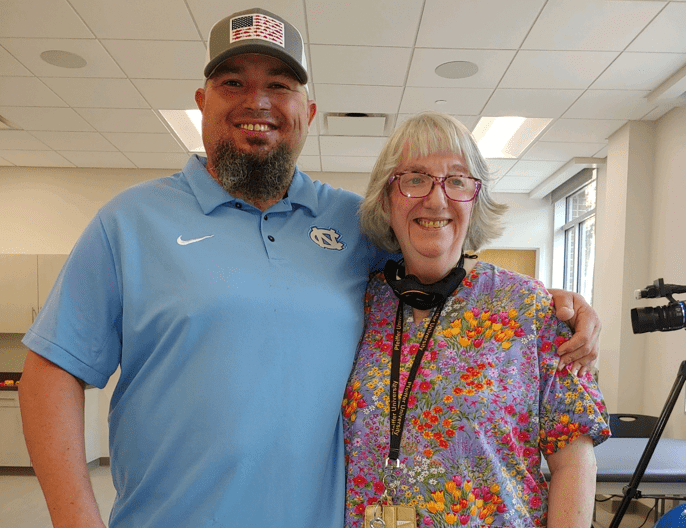
Client Makes Great Strides in OT Treatment
About two years ago, Ronnie*, who lives near Pfeiffer University’s Center for Health Sciences in downtown Albemarle, N.C., suffered a head injury and a stroke. He had trouble keeping his balance, couldn’t speak, and had lost all use of his right arm. Lacking insurance, he couldn’t afford the out-of-pocket costs of the long-term treatment he needed.
Thanks to an initiative of Pfeiffer University’s Master of Science in Occupational Therapy (MSOT) program, the OT students and their professors are working with Ronnie to assess his challenges and to implement a treatment plan to address them.
The work has yielded many positive results so far. It showcases the possibilities of the program’s ongoing effort to launch a pro bono clinic that would initially serve up to four to eight uninsured clients per semester. It is also consistent with the vision of the program’s director, Dr. Elizabeth Fain, to have students caring for real-world clients, under the supervision of faculty or clinical instructors as a part of their educational experience.
“In essence, utilizing real people with real conditions helps to solidify the book learning and the classroom learning to real application,” Fain said.
Thomas Curry, an MSOT student who hails from Staten Island, N.Y., appreciates the value of such an experience.
“As a first-year student, you dream of the chance of working with clients,” he said. “Our instructors here at Pfeiffer have been working rigorously to prepare us for that very moment. Ronnie has given members of the Pfeiffer MSOT cohort the chance to utilize and develop their skills as clinicians.”
Wendy McAllister ’15, an MSOT student from Mooresville, N.C., was an undergraduate student at Pfeiffer who double-majored in psychology and in Counseling and Human Services. She echoed Curry’s sentiments.
“Having the ability to work with Ronnie has provided us with so much insight regarding the occupational therapy profession and the City of Albemarle,” she said. “Ronnie and his family have so graciously worked with us and allowed us to learn and develop skills that we would not have the chance to do without the pro bono clinic and their willingness to participate in it.”
Before enrolling in the MSOT program, McCallister created communication software programs to assist individuals with expressive language disorders. She helped Ronnie get the most out of his communication device. He can now converse with members of his family, place an order at a restaurant, ascertain the weather for a particular day, and play his favorite songs.
Fain’s vision is to establish a pro bono clinic that can serve eight clients per semester. This would require the hiring of additional clinicians and staff. Fain estimates that securing grants and donations for that purpose will take up to two years.
Fain stressed that Pfeiffer’s pro bono OT clinic would serve uninsured clients only “so that it is not perceived as competition against any payer companies.” She plugged a win-win scenario: Students get hands-on learning of assessment processes and treatment techniques. Or they view videos of this hands-on learning, which also informs concepts they learn in class.
In return, clients get access to treatment that is hard to come by in the rural areas surrounding Albemarle, without having to pay the out-of-pocket costs. These can be crushing: A 15-minute OT assessment comes to $100. A therapeutic exercise or activity lasting 15 minutes costs $40, as does a home management session for the same amount of time. A client typically needs two or three hours of therapy a week.
The results of the treatment that Ronnie is receiving illustrates the kind of progress clients could make at the clinic. His balance is improving. His right hand can now grasp certain items because he’s mastering a technique in which he uses his left (non-affected) hand to open up the fingers of his right one. He also uses his non-affected hand to place the affected hand strategically over the item he is trying to pick up. The items now include a cookie, a spoon with a large handle, and a small ball.
Ronnie can now utter a few words of greeting slowly. He is learning to communicate a range of wishes by touching the pictures of a software program loaded on an iPad.
“Ronnie has made tremendous progress in so many areas since his initial visit with the Pfeiffer MSOT program, including his balance, coordination, visual perceptual skills, range of motion, and communication,” McAllister said. “He has grown tremendously in his independence and ability to participate in meaningful activities again.”
*Editor’s Note: We are honoring Ronnie’s request to use his first name only in this article.
Ken Keuffel, who authored this article, has served as Pfeiffer’s Assistant Director of Communications since December 2019. He welcomes story ideas from Pfeiffer’s faculty, staff, students, alumni, and friends. The form for submitting story ideas is at Story Idea/News Item Request Form.